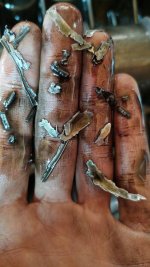dodge man
Super Star Member
I wish I could help more but my reaction is you are delaying the inevitable. Just pull the engine, crack it open and figure it out.
To the OP, I am sorry for your troubles. But, tbis is one of the most informative threads I have read in a long time. Kudos to all responding and TBN
If you load the motor and the knock gets lighter, it most likely will be a rod.
I want to think on that... What I'm trying to do is picture how that fits with no overt change in the knock when you disabled each injector.
And so far I can't reconcile the no change and the no injection. I was just so sure that would at least point to the correct cylinder even if it didn't tell us the cause.
A good way to trouble shoot the difficult ones is to divide up the problem. One problem is we don't know which cylinder, the other problem is we don't know why the knock is happening in that cylinder. We ought to be able to at least get it down to the proper cylinder.
Er, I'm assuming that your spectrum analysis is pointing towards one cylinder. Do you agree with that?
Could it even be something crazy? ....like a dangling glow plug end?
I wish I could help more but my reaction is you are delaying the inevitable. Just pull the engine, crack it open and figure it out.
To the OP, I am sorry for your troubles. But, tbis is one of the most informative threads I have read in a long time. Kudos to all responding and TBN
jshwhite
Someone may have already suggested this but have you loosened the inj lines 1 at a time with engine running to determine if knock can be isolated to a certain cylinder? If knock can be isolated to a cylinder I strongly suggest to have that injector or even all injectors pop-off pressure tested.
How many hours does it have on the oil? I think I would change it and send a sample to a lab to have it analyzed. If it is a main or rod bearing that'll tell you.
